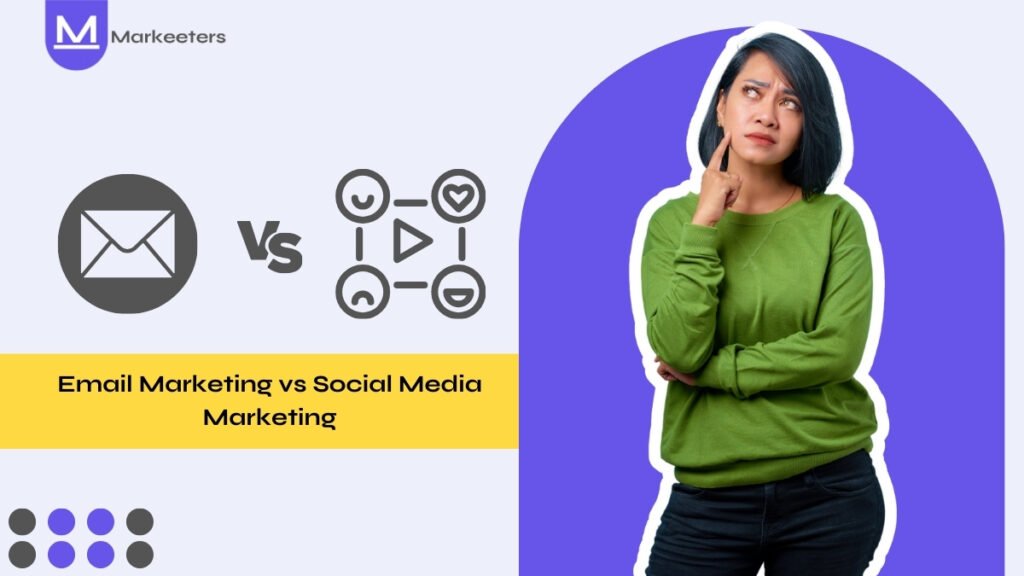Email marketing vs social media marketing – 2024 Comparison. The ultimate guide to choosing your digital marketing strategy. Make your move today, learn new trends, and maximize your impact!
Marketing expenditures are tactics are increasing as more and more avenues become available to contact customers online. But more is not necessarily better, particularly if you don’t know which type of marketing is helping you and how. Let’s consider two specific channels: email marketing and social media marketing. As a business, it is an important decision to make. It is not mandatory to use just one channel. You can blend them and distribute your content accordingly. Both have their advantages and disadvantages.
In this article, we will compare these two channels, their effectiveness and pros and cons. Our blog will assist you understand which strategy is better for your business.
Let’s go!
What is Email Marketing?
The method of sending updates or promotional emails to a list of people is referred to as email marketing. It is a tried-and-tested strategy for businesses to stay in touch with their customers. Email marketing is a direct marketing type in which audiences are reached using electronic mail. It can broadly be defined as any email sent to a prospective or existing customer.

Email marketing is an effective online marketing tactic that uses emails to maintain relationships with current and new customers, increase revenue, and produce more qualified leads. Transactional emails and newsletters are common email formats used by businesses. For example, you might send your customers a campaign featuring the most recent blog posts or a seasonal promotion. Additionally, segmentation and automation in email marketing allow marketers to create customized experiences for customers, whether they are current or potential.
Merits and Demerits of Email Marketing
Merits
Increases Conversion Rates
Research states that email marketing results in increased conversion rates. This is explained by the fact that the receivers have already shown they are interested in the business by signing up for their email list.
Easy Audience Targeting
Email marketing helps target specific audience segments for your business. It allows companies to divide their customer base according to characteristics like demographics, engagement levels, buyer’s journey stages, or past purchases. As a result, more targeted and appropriate communication is possible.
Clear and Customized Communication
Email marketing allows companies to speak directly with their customers. Customization options like dynamic content and merge tags allow you to adjust the message based on the recipient’s interests and actions.
Demerits
Needs Constant Maintenance
Email marketing calls for constant work to have an active and clean email list. Developing interest content, maintaining email deliverability, and cleaning lists on a regular basis are all critical duties that must be carried out effectively.
Can be Viewed as Annoying
Although some customers find it useful to get promotional emails from companies they are interested in, others could find it bothersome. They might even report emails as spam. The sender’s deliverability and reputation may suffer.
Possibility of Low Click-Through and Open Rates
Customers get a swarm of emails on a daily basis. It becomes difficult for a business to be seen. One of the common problems email marketers have is low click-through and open rates.
| Did you Know? |
|---|
| – The most effective strategies for email marketing campaigns are subscriber segmentation (78%), message personalization (72%), and email automation campaigns (71%). (HubSpot Blog Research, 2021) – 87% of the brands say that email marketing is very critical to business success. (Litmus, 2023) – The average email delivery rate is 85.7% (Email Tool Tester, 2023) – 55% of emails are opened on mobile devices. (eMarketer, 2023) |
What is Social Media Marketing?
Using social media platforms to increase brand awareness and lead generation is referred to as social media marketing, or SMM. SMM works to provide content that people will want to share with their social networks, allowing businesses to reach a wider audience and build their brand.

The most popular social media platforms include Instagram, Facebook, LinkedIn, and X. But there are a ton of other social networking sites available. Social media is a place where new trends emerge every day; therefore, businesses need to stay updated. Social media not only helps them remain up-to-date, but it is also an ideal chance to interact with both present and potential customers.
There are 4.89 billion social network users worldwide.
Social media involves creating and sharing content, interacting with customers to build relationships and running paid ads to generate leads.
Merits and Demerits of Social Media Marketing
Merits
Increased Brand Awareness
Social media gives businesses a way to interact with their followers and customers. They can leave comments, share, and send direct messages. By showing the company’s values and mission, unique selling proposition, and brand identity, it helps increase brand awareness.
Measurable and Economical
Social media marketing proves to be an economical choice. Various social media platforms include advertising choices that let companies define a spending limit and monitor the effectiveness of their campaigns.
Reach Wider Audience
With billions of consumers actively using social media platforms, businesses have access to a potentially wider audience. Additionally, social media content sharing makes it simpler for companies to go viral and expand their audience.
Demerits
Crowded and Competitive Space
Millions of companies are fighting for attention on social media, creating a loud and competitive atmosphere. It can become difficult to stand out and get noticed. This is true for small businesses that have budget constraints.
Constantly Changing Algorithms
Social media companies are well-known for their regular algorithm changes, which affect the visibility of business content. Businesses may need to spend money on sponsored advertising to gain visibility if their organic reach declines.
Less Control over Content
Social media platforms have certain restrictions, in contrast to email marketing. These platforms could impose restrictions on particular types of content. They also have limited options for targeting.
| Did you Know? |
|---|
| – The average person spends 145 minutes on social media everyday. (Forbes) – The ad spend on social media worldwide is 269 billion U.S. dollars. (Statista) – Instagram offers the highest ROI for selling products. (HubSpot) – 41% of Gen Z and Millennials make an impulse purchase online every 2-3 weeks. (GWI) |
Also read:
- Why Outsource Your E-Commerce Development in 2024
- Magento vs Shopify: Which E-Commerce Platform is Best for You?
Email Marketing vs Social Media Marketing
| Feature | Email Marketing | Social Media Marketing |
|---|---|---|
| Primary Platform | Social media platforms like Facebook, Instagram, X etc. | |
| Communication Format | Direct, personalized messages | Broadcast messages to broader audience |
| Message Length | Generally longer, allows detailed content | Shorter messages, often limited by character count |
| Audience Targeting | Highly targeted based on subscriber lists | Targeted based on demographics, interests, and behavior |
| Delivery Assurance | High assurance of message delivery | Dependent on algorithms and user engagement |
| Content Control | Full control over content and formatting | Limited control due to platform restrictions |
| Interactivity | Limited interactivity | High interactivity (likes, comments, shares) |
| Cost | Can be cost-effective, especially for large lists | Costs can vary, including paid advertising and content creation |
| Retention | Generally higher retention rates | Content can be fleeting, requiring consistent posting |
| Conversion Tracking | Easier to track conversions and ROI | Varied tracking options, often dependent on platform analytics |
| Spam Concerns | Risk of being marked as spam if not carefully managed | Less likely to be marked as spam, but algorithms can affect reach |
| Personalization | Highly customizable with personalization tokens | Personalization is often based on user behavior and preferences |
| Targeting Specific Stages | Suitable for all stages of the sales funnel | Primarily used for awareness and engagement stages |
| Lead Nurturing | Effective for lead nurturing and relationship building | Quick engagement but may require ongoing efforts |
| Data Collection | Collects explicit data through sign-ups and preferences | Gathers implicit data based on user interactions |
| Mobile Optimization | Needs to be optimized for mobile devices | Platforms are inherently mobile-friendly |
| Long-Term Value | Often provides long-term value through subscriber relationships | Immediate impact but requires consistent effort for sustained results |
Learn more:
- Website Selling vs Online Marketplace: Which is Better?
- In-House Web Development vs Outsourced Web Development
Email Marketing vs Social Media Marketing: A Detailed Comparison

Email Marketing vs Social Media Marketing: Users
Email Marketing Perspective
Email users are higher in number than social media users. Most people check their emails first thing in the morning. They also check their emails multiple times a day, providing many opportunities for engagement. Subscribers voluntarily sign in for emails, which indicates a higher quality of leads that are potentially more receptive to your messages.
Social Media Marketing Perspective
Social media platforms have billions of active users. Social media users have diverse engagement patterns. People check their feeds multiple times a day, while some visit less frequently. Also, users have the option to follow and unfollow brands and businesses, so they may not want to engage with your business.
Email Marketing vs Social Media Marketing: Reach
Email Marketing Perspective
The people who subscribe to your emails are already interested in finding out more about your business and the products or services you offer. Reaching them with discounts, promo codes, and other offers is more likely to be effective.
Social Media Marketing Perspective
Social media gives access to a wider audience and an infinite stream of prospective customers. But this also brings a lot of competition. It can be challenging to sort through the crowd on social media platforms because every business is using them. Therefore, your content should be relatable and leave a bigger impact on the people who see it. Using hashtags can help broaden your audience.
Email Marketing vs Social Media Marketing: Conversion Rate
Email Marketing Perspective
Email marketing helps increase the conversion rate because recipients of your emails are more inclined to buy your products or services. Your receivers voluntarily agreed to receive information about your business, its products, and services. There are more factors that contribute to email marketing’s effectiveness, such as customer segment lists, and customization, and you can send customized messages to your customers or receivers based on their past buying behavior.
Social Media Marketing Perspective
Social media’s ability to raise conversion rates is not always consistent. Users may follow or become fans of your company, but that does not imply that they are qualified leads and would buy your products or services.
Email Marketing vs Social Media Marketing: Cost and ROI
Email Marketing Perspective
It is more affordable to use email marketing than other digital marketing methods. Businesses may increase their ROI using automated features and cost-effective email marketing software.
Social Media Marketing Perspective
For social media marketing, paid advertising is necessary to compensate for the drop in organic reach. Effective targeting choices can help produce a favorable ROI for your business.
Email Marketing vs Social Media Marketing: Engagement
Email Marketing Perspective
Email marketing generates engagement, but generally to a lesser extent. The primary indicator of engagement is open rates, but it can also be the quantity of readers that click through from the email to your website. You can try using attention-grabbing subject lines in your emails to try to increase open rates. Add interactive features to your emails. Encourage readers to click over and engage with you on your website. Adding customization is another approach to increasing email engagement.
Social Media Marketing Perspective
Posts on social media can also encourage people to visit your website and interact with your brand or company even more. With this kind of marketing, you can provide a variety of content, such as interactive products, to lure visitors and establish a relationship that will encourage them to return to your social media feed. Posts have the tendency to go viral, which raises the possibility of even more exposure and engagement.
For example: GoPro shares UGC content to catch their audience’s attention.
Email Marketing vs Social Media Marketing: Conclusion
To guarantee the success of your marketing plan, you need to use a range of platforms, networks, and channels. Incorporate a blend of email marketing and social media marketing. Reaching a wider audience base, increasing conversion rates, and driving more traffic to your website all depend on figuring out the best combination of these for your company. The combination of email and social media marketing helps increase the effectiveness of the business and establish long-term relationships with your customers. While email helps you generate conversions, social media helps your brand engage and attract new customers.
FAQs
Which is better email marketing or social media marketing?
Email marketing is excellent for establishing relationships with existing clients. Social media marketing can help increase brand awareness with new customers. Choosing which approach to prioritize will help you create a more customized and successful plan for a business.
Is email marketing still relevant in 2023?
Email marketing is reliable and affordable. It gives businesses control and continues to be one of the most popular marketing methods. It offers businesses greater control over their messaging and reach because it is an owned media channel.
What is the ROI of email marketing vs social media?
Email marketing often yields a far better return on investment. It is reported that email created $36 for every $1 invested, which is an outstanding 3600% ROI. On the other hand, social media is predicted to yield a $2.80 ROI for every $1 invested.





